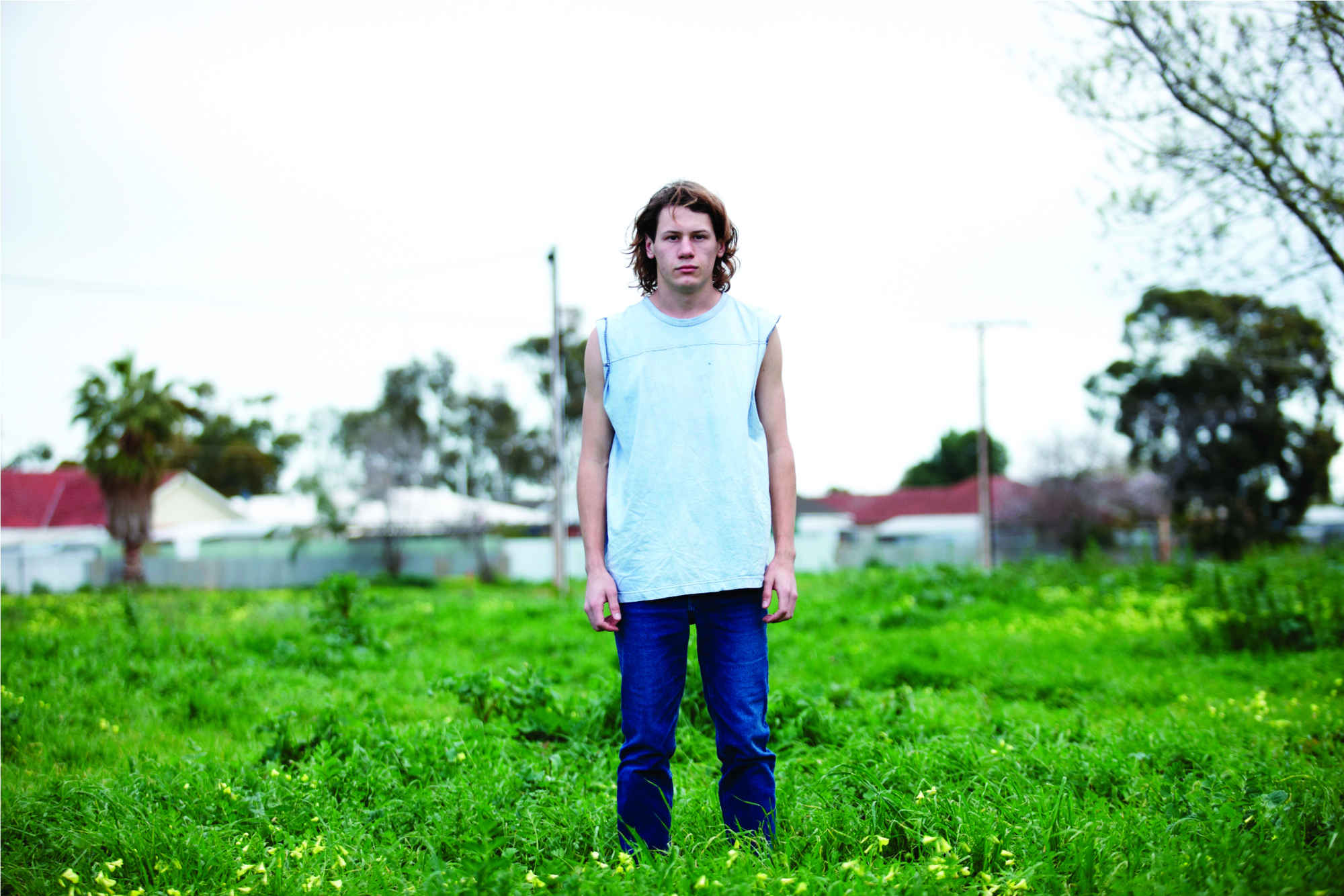Although only one of the twelve shocking murders that constitute Australia’s most notorious serial killings occurred there, the very name Snowtown – a small town 145 kilometres north of Adelaide – has become synonymous with some of the most unspeakable and unimaginable horrors to take place in this country. The discovery of eight bodies in six acid-filled barrels in an old bank building on 20 May 1999 revealed the grisly, detailed reality of what public memory remembers only under the umbrella terms of ‘torture’ and ‘murder’: flayed, slashed and cut bodies, often the victims of extreme sexual and non-sexual mutilations executed with as diverse and sickening an array of weapons as pliers, cigarette lighters and fireworks. After the longest criminal trial ever recorded in South Australian history, 37-year-old John Bunting was convicted of eleven murders,[1]The twelfth charge, for the murder of Suzanne Allen, was dropped due to lack of evidence. and his accomplices Robert Wagner, James Vlassakis and Mark Haydon were convicted of a range of additional offences spanning from covering up the crimes to assisting in the murders themselves.
What began for Bunting and his cohorts as a vicious campaign against homosexuals and paedophiles (who for him were one and the same) evolved into a series of murders that targeted the weak and socially neglected: the sick, the disabled, drug addicts and ultimately anyone who sparked Bunting’s ire. According to Gail Mason, the killings became ‘increasingly ritualised’, and incorporated ‘the use of music, repetitive behaviour and key phrases’.[2]Gail Mason, ‘Hate Crime as Moral Category: Lessons from the Snowtown Case’, Australian and New Zealand Journal of Criminology, vol. 40, no. 3, December 2007, p. 250. During their ordeals, many victims were forced to record messages onto tapes explaining their absence, which Bunting and his accomplices would play back to the victims’ families and loved ones to discourage them from investigating their disappearance. Bunting also attained personal information from his later victims, allowing him to fraudulently collect between $70,000 and $95,000 worth of Centrelink benefits.
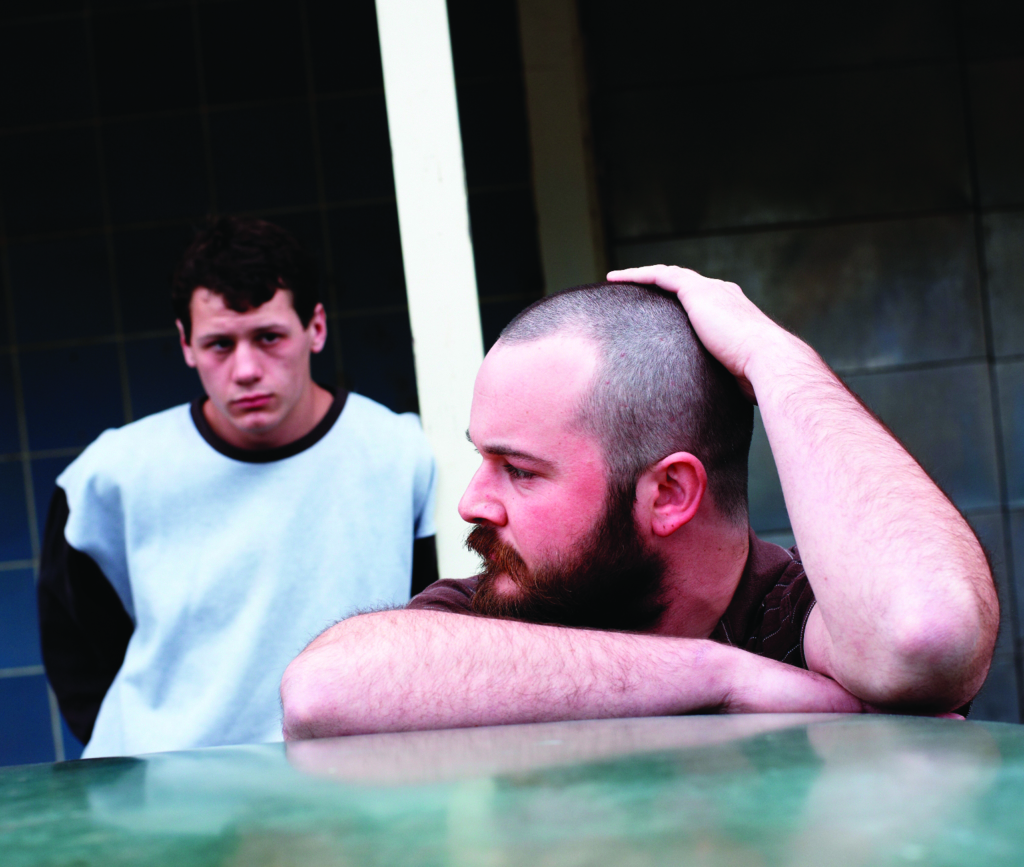
The overwhelming ferociousness of the so-called Snowtown murders renders them far more challenging to bring to the screen than most other Australian true crime stories. Bunting’s story does not engage with the ‘wild colonial boy’ mythology that violent yet loveable ‘bad boys’ like Chopper Read or Ned Kelly evoke. Closer in tradition to Fred West or Ed Gein, Bunting’s crimes offer an altogether different history in their bleak reality, where violence, hate and class erupt in a frenzy of torture, mutilation and murder. This is a far cry even from the perverse charm of Wolf Creek’s (Greg McLean, 2005) Mick Taylor (John Jarratt): while Wolf Creek has some ties to reality, being a loose amalgam of the Ivan Milat and Bradley John Murdoch killings, the grim reality of Bunting’s crimes are as far from McLean’s deliberate subversion of the Mick ‘Crocodile’ Dundee figure as can be imagined.
Despite offering a brave and intelligent interpretation of the story leading up to the discovery of the barrels – for a number of reasons that will be explored further in this article – Snowtown (Justin Kurzel, 2011) finds its ethical view decidedly divided. On one hand, the film’s treatment of its central Vlassakis figure addresses the ethical minefield of the terrifying and tragic cycle where victims of violence can themselves become perpetrators. At the same time, the film’s treatment of Bunting relies heavily upon a two-dimensional melodramatic depiction of old-fashioned, moustache-twirling evil, marked as much by his terrifying crimes as by the absence of any real enquiry into his personality. But it is this lack of information that has marked the Snowtown case itself more broadly: since the first arrests were made in 1999, 229 suppression orders have been applied to the case (including one relating to information of cannibalism),[3]Andrew McGarry, ‘Gag Orders Defended in Wake of Snowtown’, The Australian, 21 September 2005, p. 4. and as of January 2011, more than 150 of these remain in place.[4]Verity Edwards, ‘Judge Clears Way for Snowtown to Screen’, The Australian, 21 January 2011, p. 3. This is a case marked by rumour, innuendo and fear, but most of all by the unutterable nature of its details. Be it due to legal necessity or the sheer horror that befell Bunting’s victims, the film itself – like the very word ‘Snowtown’ – speaks of contradictory and confusing silences as much as it does of facts.
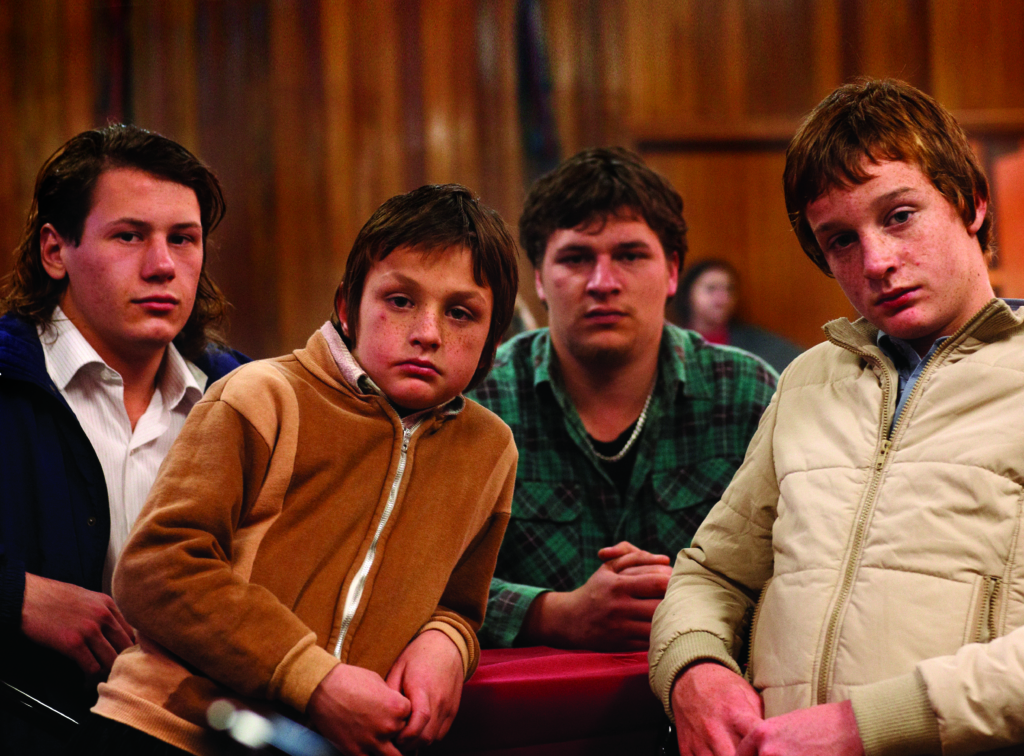
Snowtown: from headline to screen
Kurzel grew up in Gawler, about a thirty-minute drive from where the bulk of the murders took place, in Salisbury North in Adelaide.
Snowtown, which marks Kurzel’s feature debut, began shooting in August 2010, and the director was adamant that they maintain a particular sensitivity towards the fact that they were telling the story of real people in a real place. As such, he shot on location with a cast of mostly local actors. The movie closely follows the teenage character of Jamie (Lucas Pittaway, based on Vlassakis), who lives with his mother Elizabeth (Louise Harris) and two younger brothers in a bleak home in suburban Adelaide. After all three boys fall victim to a local paedophile, Elizabeth struggles to support her children. Later, when the charismatic John (Daniel Henshall) appears, he provides a sense of paternal security for the boys, particularly Jamie. By the time John’s darker side begins to make itself apparent to Jamie, the deeply traumatised boy is far too emotionally reliant on John to extract himself from his mentor’s violent control. Conflicted and alienated to the point where he turns to heroin, Jamie is so damaged by his earlier sexual abuse and John’s influence that he participates in a number of the crimes, including the final murder in the notorious Snowtown bank vault.
Snowtown is a sophisticated and confidently produced film whose slickness never becomes self-indulgent or irrelevant to its central thematic concerns.
As many of the victims’ families are still alive and the locations in question are areas where many residents face ongoing economic and social hardships, the filmmakers went to great lengths to treat the film’s subject matter with sensitivity. They liaised with the Victims’ Rights Commissioner Michael O’Connell, the Snowtown Management Committee and a number of other groups and individuals from Adelaide’s northern suburbs. Regardless, the project has hardly been immune to controversy, with one news report claiming it attracted ‘the ire of victims’ families and Snowtown residents’, and that despite the fact that ‘more than 40 relatives were invited to a private screening … none chose to attend’.[5]‘Film Angers Relatives’, The Sunday Age, 27 February 2011, p. 2. An article in Melbourne’s Herald Sun seeks a different avenue for potential controversy, expressing outrage that $250,000 of Victorian tax dollars would be spent on the film’s production. The newspaper goes on to quote victims-of-crime advocate Steve Medcraft, who argues, ‘it’s insulting that the State Government is spending money on glorifying murders in South Australia and victims don’t even have access to appeal costs like accommodation and travel’.[6]Anne Wright & Lucie van den Berg, ‘We Pay to Make Murder Movie’, Herald Sun, 3 March 2010, p. 3. Despite – or perhaps because of – the controversy surrounding the film, its success has not yet been greatly hindered. It won the audience award when it premiered in early 2011 at the Adelaide Film Festival, and was selected to play at the prestigious Critics’ Week at this year’s Cannes Film Festival.
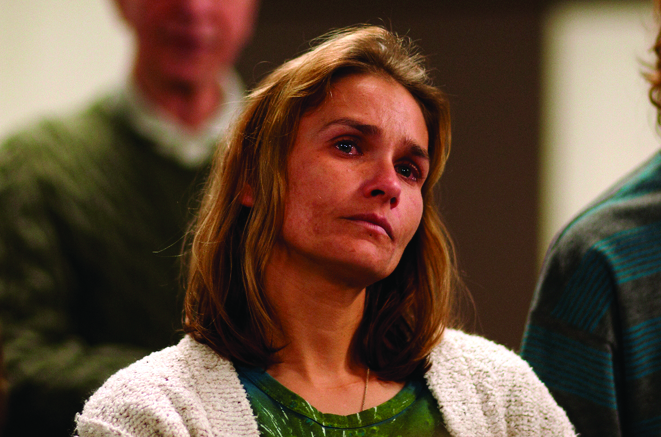
Treading a fine line
Any accolades are fully deserved. With its only glaring formal weakness being a reliance upon the currently ubiquitous blue-green colour palette, Snowtown is a sophisticated and confidently produced film whose slickness never becomes self-indulgent or irrelevant to its central thematic concerns. Kurzel’s earlier experiences near suburbs like Salisbury North grant him a vision of a world that he makes diegetically true: it is a world that those from Sydney’s North Shore or Melbourne’s inner-eastern suburbs may too easily dismiss as clichéd, but one that some of us will recognise on a near-visceral level to be grounded in reality. The performances are exceptional, with Pittaway and Harris in particular bringing a quiet desperation to their roles that excludes any sense of synthetic earnestness. Snowtown should also be commended for avoiding exploitation. If viewed on its own, the one moment of truly graphic violence may seem reminiscent of the now arguably defunct ‘torture porn’ horror subgenre, but in the context of the film it is absolutely vital. Without it, the degree of violence that marked these murders would not just have been softened, but actively denied. Snowtown carefully treads the dangerously fine line between acknowledging the ferocity and cruelty of these murders and unnecessarily revelling in the gory details.
The project can be described as nothing short of brave for its head-on engagement with the morally hazy terrain where victims become perpetrators.
Even more crucially, the project can be described as nothing short of brave for its head-on engagement with the morally hazy terrain where victims become perpetrators. In her excellent article ‘Hate Crime as a Moral Category: Lessons from the Snowtown Case’, Mason stops short of calling the Bunting murders hate crimes as such, but goes to some lengths to emphasise that the homophobia that fuelled the initial killings almost disappeared in ‘a media cocktail of serial killing, social security fraud, deviant sexuality, dismemberment and the pathology of Adelaide’s underclass’.[7]Mason, op. cit. While never justifying the dangerous and erroneous act of equating homosexuality with paedophilia, Snowtown still paints a convincing portrait of how Jamie understood John’s obsessive and ultimately murderous homophobia in light of the sexual abuse that Jamie had suffered (and suffered, no less, in two of the film’s most harrowing and memorable scenes).
Unanswered questions
Despite the film’s profound investigation into why and how someone like Vlassakis could be involved in the atrocious acts that etched this case so deeply into the popular memory, Snowtown stops short of examining the same questions of Bunting. The most obvious reason for this is simply that any depiction of Bunting beyond that of a two-dimensional villain who embodies pure evil could be misconstrued as potentially defending Bunting and his actions. Even the most vague suggestion of sympathy risks demeaning the seriousness of his crimes, which, in terms of the surviving families and loved ones of those victims, is not just offensive, but ethically grotesque. This observation does not, therefore, stand to suggest that the filmmakers should have done otherwise – I do not believe they could have, given the sensitive climate that still dominates the case – but rather seeks to emphasise that the Bunting murders still hinge upon a discourse of what can be spoken about and what cannot. What those still-standing 150-plus suppression orders concern may never be known, and depending on one’s personal politics, perhaps should never be. However, the public record does contain information about Bunting that Snowtown itself sought to suppress: in his 2005 book Snowtown: The Bodies in Barrels Murders, Jeremy Pudney notes that Bunting’s early racist and homophobic attitudes culminated in a fascination with neo-Nazism, that he had worked in both an abattoir (as did Fred West) and a crematorium, and, significantly, that Bunting had told friends that he was sexually assaulted by a friend’s older brother when he was eight years old.[8]Jeremy Pudney, Snowtown: The Bodies in Barrels Murders, HarperCollins, Sydney, 2005, pp. 12–14.
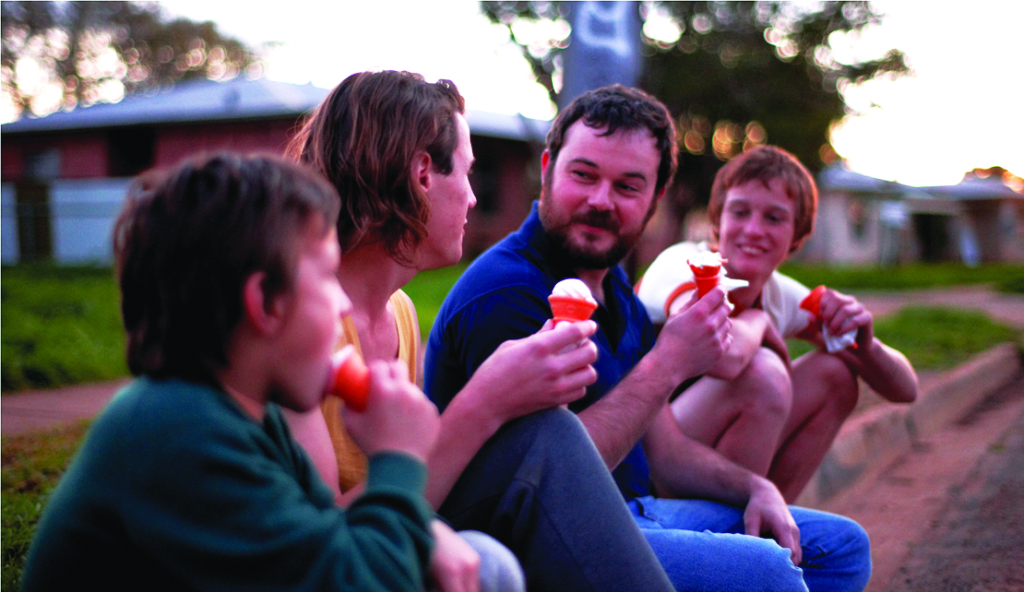
A less complex but more obvious issue with the film is the name itself: why name it after Snowtown when so little of the film’s action (and the story that it is based on) actually occurred there? This relates to the question residents have been asking since the macabre discovery in their otherwise quiet town: why does Snowtown get the notoriety when most of the crimes (and the killers themselves) were based in Adelaide? Again, the filmmakers are certainly not to be held responsible for an issue that far surpasses their involvement. Indeed, the very word ‘Snowtown’ became synonymous with the case long before the film project even began, and one can hazard a guess that the title ‘Salisbury North’ would not so immediately provoke the same intensity that Snowtown does. However, by maintaining the focus on Snowtown through its name alone, the film only adds to the seemingly inescapable legacy of Bunting’s crimes on that small town, a community that has already carried the weight of notoriety for well over a decade.
The gaps that exist among the publicly known facts add to the haunting and horrifying impact of Bunting’s crimes, granting them a legacy and a power unlike any other Australian true crime story brought to the screen. Indeed, it is as much what is known as what remains hidden that makes Snowtown so captivating. That so many questions remain unanswered in the case make it only fitting that the film itself should present an equally unsolvable, and at times even contradictory, representation of a moral universe, where pure evil can exist alongside an ethical grey area that refuses to allow such simplistic binaries. Nothing on the road to Snowtown was simple – for its victims or its perpetrators – and it is therefore appropriate that the same complexity and confusion still dominates the story in this recent cinematic treatment.
Endnotes
| 1 | The twelfth charge, for the murder of Suzanne Allen, was dropped due to lack of evidence. |
|---|---|
| 2 | Gail Mason, ‘Hate Crime as Moral Category: Lessons from the Snowtown Case’, Australian and New Zealand Journal of Criminology, vol. 40, no. 3, December 2007, p. 250. |
| 3 | Andrew McGarry, ‘Gag Orders Defended in Wake of Snowtown’, The Australian, 21 September 2005, p. 4. |
| 4 | Verity Edwards, ‘Judge Clears Way for Snowtown to Screen’, The Australian, 21 January 2011, p. 3. |
| 5 | ‘Film Angers Relatives’, The Sunday Age, 27 February 2011, p. 2. |
| 6 | Anne Wright & Lucie van den Berg, ‘We Pay to Make Murder Movie’, Herald Sun, 3 March 2010, p. 3. |
| 7 | Mason, op. cit. |
| 8 | Jeremy Pudney, Snowtown: The Bodies in Barrels Murders, HarperCollins, Sydney, 2005, pp. 12–14. |
